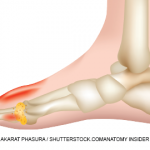The patient was prescribed 40 mg/day of febuxostat to start, and based on another strong recommendation, began to take 0.6 mg/day of colchicine as concomitant anti-inflammatory medication. The patient’s treatment was adjusted to reach a target of 6 mg/dL, not to alleviate his many gout symptoms, and his febuxostat was increased to 80 mg/day two months later because his serum urate failed to reach the target, said Dr. Edwards. His tophi were also unchanged. Based on another strong recommendation, the patient was switched to pegloticase for six months until his serum urate improved to 3.7 mg/dL. His flares and tophi resolved, and he was transitioned back to 80 mg/day of febuxostat with close follow-up.
Frequent Updates Reflect New Evidence

Dr. Neogi
Data published after 2012 supported several important changes, said co-principal investigator Tuhina Neogi, MD, PhD, rheumatology section chief and professor of medicine at Boston University School of Medicine. Recent trials that panelists used to support recommendations include a 2017 randomized, controlled trial on the benefits of febuxostat in patients with early gout and infrequent flares; the 2018 CARES Trial, which compared the cardiovascular safety of febuxostat and allopurinol; and a 2019 study on the benefits of nurse-led gout care, which supported the conditional recommendation for augmenting ULT with evaluation by a non-physician healthcare provider.1-3
The ACR’s methodological approach to guideline development, which includes consideration of the totality of the literature, may differ from other societies, she said. The ACR’s recommendations are made largely on the basis of quality of evidence (among other factors), and strong recommendations are usually based on the results of randomized, controlled trials, but “some specialty societies will only make recommendations in the context of randomized trials. We don’t have randomized trials to address every single clinical question of relevance. We need to be able to look at other evidence to help develop actionable guidelines.”
Susan Bernstein is a freelance journalist based in Atlanta.
References
- Dalbeth N, Saag KG, Palmer WE, et al. Effects of febuxostat in early gout. Arthritis Rheumatol. 2017 Dec;69(12):2386–2395.
- White WB, Saag KG, Becker MA, et al. Cardiovascular safety of febuxostat or allopurinol in patients with gout. N Engl J Med. 2018 Mar 29;378(13):1200–1210.
- Doherty M, Jenkins W, Richardson H, et al. Efficacy and cost-effectiveness of nurse-led care involving education and engagement of patients and a treat-to-target urate-lowering strategy versus usual care for gout: A randomised controlled trial. Lancet. 2018 Oct 20;392(10156):1403–1412.
Editor’s note: This article was edited on Dec. 5 to reflect current information.


